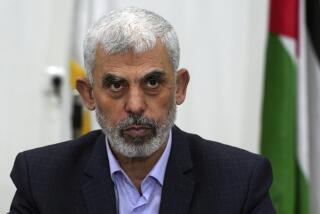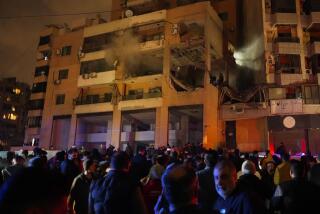Hamas Leader May Plead for Nonviolence
- Share via
JERUSALEM — With Israel’s neck-and-neck election just five days away, there were reports Friday that the jailed founder of the Islamic militant group Hamas will call for an end to terrorist attacks against Israel.
Such an announcement by Sheik Ahmed Yassin in the campaign’s home stretch could provide a boost for the election prospects of Prime Minister Shimon Peres, whose Labor Party government has worked with Yasser Arafat’s Palestinian Authority to counter the terrorist threat.
But even if Yassin issues an unequivocal plea for nonviolence, it would not eliminate the threat of more suicide bombings because Hamas is known to be divided, with leaders outside Israel and the Palestinian-controlled territories still advocating the use of force.
Polls have shown Peres maintaining a narrow lead over his rival, opposition leader Benjamin Netanyahu of the Likud Party, who argues that an uncompromising stance toward the Palestinians is the best assurance of peace and security for Israelis.
Yassin, a quadriplegic since a soccer accident in his youth and blind in one eye, founded Hamas in 1987 and has been confined to an Israeli prison since 1989 for urging the killing of Palestinians who collaborated with Israeli authorities.
In the past, he has smuggled statements out of prison and occasionally been permitted to speak to his followers through the Israeli media.
A Hamas political leader in the West Bank city of Nablus, Sheik Hamed Bitawi, said late Friday that Yassin “might very well” issue a statement calling on Hamas followers to refrain from violence.
Earlier, Hamas officials who insisted on anonymity told news agencies that such a call would be forthcoming.
The reports followed a statement this week by Yassin’s spokesman, Dr. Mahmoud Zahhar, that 20 Hamas scholars and political leaders in the West Bank and Gaza Strip were urging Hamas’ military wing, the Iziddin al-Qassam, to halt armed operations.
Unlike Hamas leaders abroad, the leadership within the Palestinian territories wants to move the organization away from militancy and toward acting as a democratic alternative to Arafat’s Palestine Liberation Organization.
However, it is not clear how much influence the internal leaders have over the Hamas militia fighters whose wave of four suicide bombings in February and March claimed more than 60 lives, including those of the bombers, and traumatized Israeli society.
“You must understand that Hamas scholars or political persons have nothing to do with the young men. We do not know from whom or where they receive their orders, and naturally whoever gives the order is the one who can tell them to stop,” Bitawi said. “However, a call from Sheik Yassin will have a positive effect.”
Calls for nonviolence by Hamas figures in Israel and the Palestinian territories are motivated by the upcoming election, according to Dr. Khalil Shikaki, a West Bank political scientist and expert on Hamas.
“They are voting,” he said. “They are trying to prevent a certain election result--they do not want Netanyahu to win.”
Such calls also represent a risk by the internal Hamas leaders that could cause an open split with the militant leaders outside Israel--believed to be mainly in Jordan, Syria and Iran, Shikaki said.
On the other hand, he said, Hamas leaders believe that they must do what they can to influence public opinion in favor of Peres, because a Netanyahu victory would slow the peace process and Hamas would be blamed within the Palestinian community.
Peres’ government has said repeatedly that it expects another terrorist bombing before the vote Wednesday. Shikaki agreed that Israelis and Palestinians dare not relax their vigilance.
But he said that the new moderate tone emanating from Hamas leaders shows that the crackdown after the bombings ordered by Arafat has “paid off.”
Arafat’s police rounded up more than 900 alleged adherents of Hamas and another militant group, Islamic Jihad, and an estimated 700 are still in jail.
Peres, meanwhile, closed the West Bank and Gaza for security reasons, keeping as many as 60,000 Palestinians from reaching jobs in Israel.
More to Read
Sign up for Essential California
The most important California stories and recommendations in your inbox every morning.
You may occasionally receive promotional content from the Los Angeles Times.













